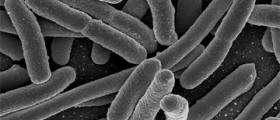
Escherichia coli or simply E. coli is a bacterium that is emerging as the cause of foodborne illnesses. Foodborne illnesses are those illnesses that are transmitted and contracted through consumption of contaminated foods, usually meat, but it can also be transmitted through dairy products, seafood, fruit and vegetables.
The strain of E. coli that is most commonly responsible for foodborne illnesses, with gastrointestinal problems, is O157:H7. This particular strain is believed to affect as much as 73. 000 people in the United States each year. Out of that number, two thousand patients require hospitalization and 91 cases end in death.
The E. coli O157:H7 strain is more dangerous than other E. coli strains that may affect humans, mostly because of a powerful toxin it releases in the gastrointestinal tract.
Signs and symptoms of foodborne E. coli illness
First signs and symptoms of O157:H7 strain, which is a foodborne strain, start several hours or one day after consuming contaminated foods. The initial symptoms include abdominal cramps, which can be quite intense, and frequent and very watery diarrhea, sometimes with traces of blood in it. Diarrhea often becomes very severe and leads to dehydration.
Some patients exhibit no symptoms at all, or their symptoms are very mild and confused with the so-called stomach flu. In most cases the symptoms stop within five to ten days.
The typical symptoms of foodborne E. coli are not very dangerous, especially if dehydration is prevented with appropriate intake of fluids. However, in some cases certain complications develop and they can be quite dangerous.
Hemolytic uremic syndrome
In about two to seven percent of cases, patients develop hemolytic uremic syndrome, characterized by destruction of red blood cells, damage to the blood vessels and kidney failure. Persons who are at higher risk of hemolytic uremic syndrome are children and older people.
A similar syndrome called thrombotic thrombocytopenic purpura, with anemia, low platelet count and potential kidney failure is another possible complication from foodborne E. coli, usually affecting the adults.
Treatment
The infection with E. coli O157:H7 is diagnosed basing on the laboratory tests which check for the presence of this bacterial strain in the stool. As for the treatment, in most cases antibiotics are not necessary, although many practitioners prefer prescribing a short course of antibiotics just in case. On the other hand, some experts believe that prescribing antibiotics for E. coli will not only do nothing for the course of the illness but it will also increase the risk of kidney complications.

















Your thoughts on this
Loading...